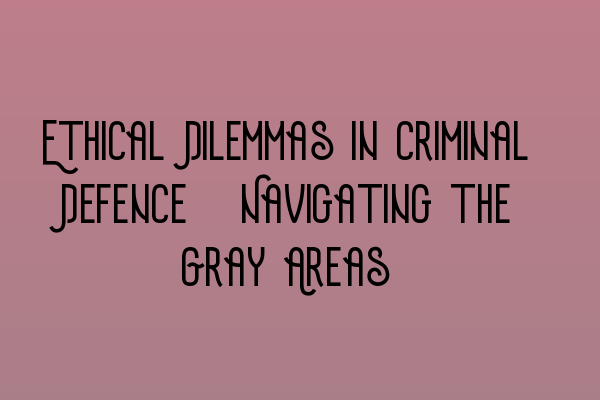Ethical Dilemmas in Criminal Defence: Navigating the Gray Areas
As criminal defence solicitors, we are often faced with complex ethical dilemmas that require us to navigate the gray areas of the law. The field of criminal defence is riddled with challenges and moral conundrums that test our commitment to justice and fairness. In this blog post, we will delve into some of the most common ethical dilemmas faced by criminal defence solicitors and explore how to handle them with integrity.
The Duty of Confidentiality
One of the fundamental principles of the legal profession is the duty of confidentiality. As criminal defence solicitors, we are entrusted with our clients’ most personal and sensitive information, and it is our duty to keep that information confidential. However, there can be instances where fulfilling this duty conflicts with our ethical obligations to the court and the administration of justice.
For example, what if a client discloses during a consultation that they are planning to commit a future crime? As solicitors, we are not legally required to disclose this information, but doing so may prevent harm to others. This is a classic ethical dilemma that tests our commitment to both our clients’ rights and the greater good. Balancing these competing interests requires careful consideration and adherence to our professional obligations.
Conflicts of Interest
Conflicts of interest can arise in criminal defence cases when one client’s interests clash with another client’s or the solicitor’s own interests. While it is our duty to act in our clients’ best interests, we must also avoid situations where our personal or professional relationships could compromise our ability to provide impartial advice and representation.
As criminal defence solicitors, we must carefully evaluate any potential conflicts of interest before taking on a case. This includes assessing our relationships with other parties involved in the case, such as witnesses, victims, or other clients. By identifying and managing conflicts of interest, we can ensure that our representation remains objective and ethical.
Zealous Advocacy vs. Professional Conduct
A criminal defence solicitor’s duty is to act as a zealous advocate for their clients, vigorously defending their rights and interests. However, this commitment to zealous advocacy must not override our duty to act ethically and uphold the standards of professional conduct.
For example, we may face a situation where a client confesses their guilt to us, but still wants to mount a defense claiming innocence. While we can present arguments in favor of our client, we must not knowingly present false evidence or deceive the court. Balancing our duty of zealous advocacy with our ethical obligations requires skill and integrity.
Conclusion
Navigating the ethical dilemmas inherent in criminal defence work is no easy task. It requires a deep understanding of our professional obligations, a commitment to justice, and the ability to make difficult decisions in the best interest of our clients and the legal system.
At SQE Criminal Law & Practice Law UK, we strive to uphold the highest ethical standards in our practice. If you are preparing for the SQE exams, check out our SQE 1 Practice Exam Questions and SQE 1 Practice Mocks FLK1 FLK2 to enhance your knowledge and test your understanding. Additionally, our SQE 2 Preparation Courses and SQE 1 Preparation Courses can provide you with the necessary resources and guidance for exam success. Stay up-to-date with the latest SRA SQE Exam Dates by visiting our website.
